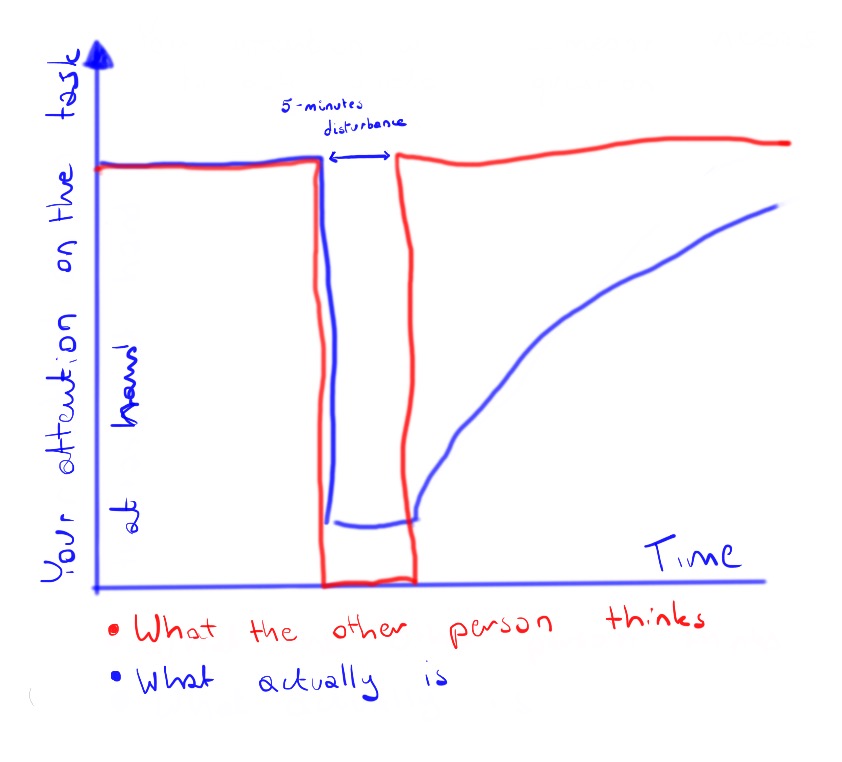Deep Work - working effectively on demanding tasks

People often think that if they disturb us for “just” 5 minutes, we will be able to get back to our work without noticing it. Well, this is not how our brain works.

One part of this problem is losing the clue, as shown on the image below (known as cognitive switching penalty). It sometimes can be challenging to come back, but I wouldn’t call it the main problem. Something much more problematic is something that harms our ability to concentrate on a complex or attention-demanding task. Something connected to how our brain solves problems.

Constant processing
Our brain thinks at many more levels than our conscious attention. For instance, when you learn something, it is not that this knowledge goes to some drawer. It needs to connect with your existing knowledge and change your view of the world. Most of that happens unconsciously, without our attention.
This process can take hours, and it reserves some part of your brain. The same if you:
- need to make an important decision,
- if something significant has changed,
- when you try to solve a hard problem or a puzzle, etc.
You might remember a situation when you were walking and thinking about nothing, and then poof, you were struck by an important realization or an idea. Where did it come from? Heaven? Air? No, it came from your brain’s subconscious part that has been working on this problem without you even noticing it.
This process runs nearly all the time, and we cannot stop it. When something needs to be processed, we cannot use our undivided attention on the task at hand, and we are disturbed.
To make a more visible example, imagine that you have heard important news about your friend or family. You will likely be distracted for the rest of the day or even the week. If it is very significant for you, it will be noticeable. Less important news would not be so apparent, but it would make a difference as well.
The same happens when you watch an exciting movie in the morning. We often remember films quite well, because our brain thinks it is something important. So after watching movies, your brain needs time and resources to process them, so you cannot use them on the current tasks.
That is an important lesson: A short video on YouTube you watch at work is much more expensive for your employer than it looks like. It might decrease your performance for hours.
Ok, we know what the problem is. So what is the solution?
Deep Work
Prof. Cal Newport, in his book “Deep Work”, introduced a concept of, well, the deep work. It is the ability to focus without distraction on a cognitively demanding task. It requires some skill, but primarily it requires a clear mind.
Without deep work, you can write an email or a message, but it is hard to write a book or solve a complex problem. We need deep work for cognitively demanding tasks, like:
- writing,
- programming,
- learning,
- non-trivial problem-solving.
These are the same tasks that are becoming more and more important nowadays.
So how can we use it? Two primary components required to do deep work are:
- a skill to concentrate for a longer time without distracting yourself,
- a clear mind and lack of outside world distractions, like notifications, meetings, or messages.
The first one comes with practice - reading books is an excellent way to practice it. The second one requires discipline and changes in your environment. The essential rules are:
- block distractions (turn off notifications, find a quiet place),
- do not consume unrelated content or news before or during work,
- make effective breaks (spend your brakes in quiet, on a walk, meditation, exercise, a nap)
- set up boundaries, when should you work and when should you have a break or finish your work.
Long and demanding tasks
If you need to finish a very demanding task, like a book or a thesis, a good trick is to escape from the world and do it in solitude. This trick is popular among writers (Carl Jung, Cal Newport, J.K. Rowling… actually when you read interviews with the most famous authors, there is nearly always a part where they find a place of solitude to write).
A milder version is to reserve the whole day on this task and do absolutely nothing else.
If you cannot do that, another way is to wake up an hour earlier and spend it writing. It might be hard at first to wake up earlier, but it will get easier over time. You can almost always schedule your first hour, and that’s when your mind is the clearest.
I practiced all these tricks and, well… this is how I’ve managed to finish my two books, and almost all the posts on this website were written using one of those tricks.
Multitasking → Shallow work
One of the biggest enemies of deep work is multitasking. It is when you often have to switch between different problems and contexts. Your brain works on all of them at once, and for each of them, your thoughts are shallow. An essential example of shallow work is answering emails - most have a different context, and you can spend only a limited time on each of them. However, this work is often necessary, especially in corporations where people are involved in many projects at once. It is fine, as long as you do not need to work on something deeper.
It is hard to switch from shallow work to deep work. It is easy the other way around.
One trick, popular among programmers, is to start your day with deep work and keep emails and meetings for later hours. In the morning, your brain is generally free of distractions, and it is good to keep it this way and use it to work deep for the first hours. At some point, you will need to start working on shallow tasks because they have to be finished as well. This way, you can effectively connect deep and shallow work.